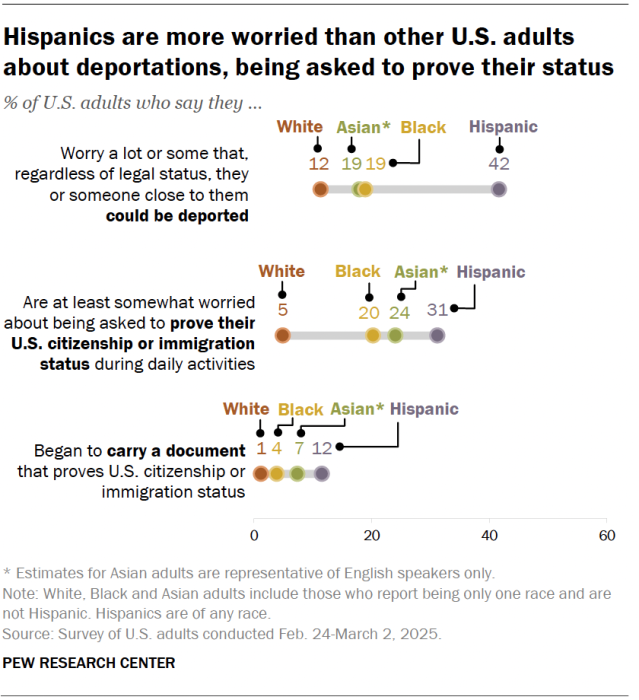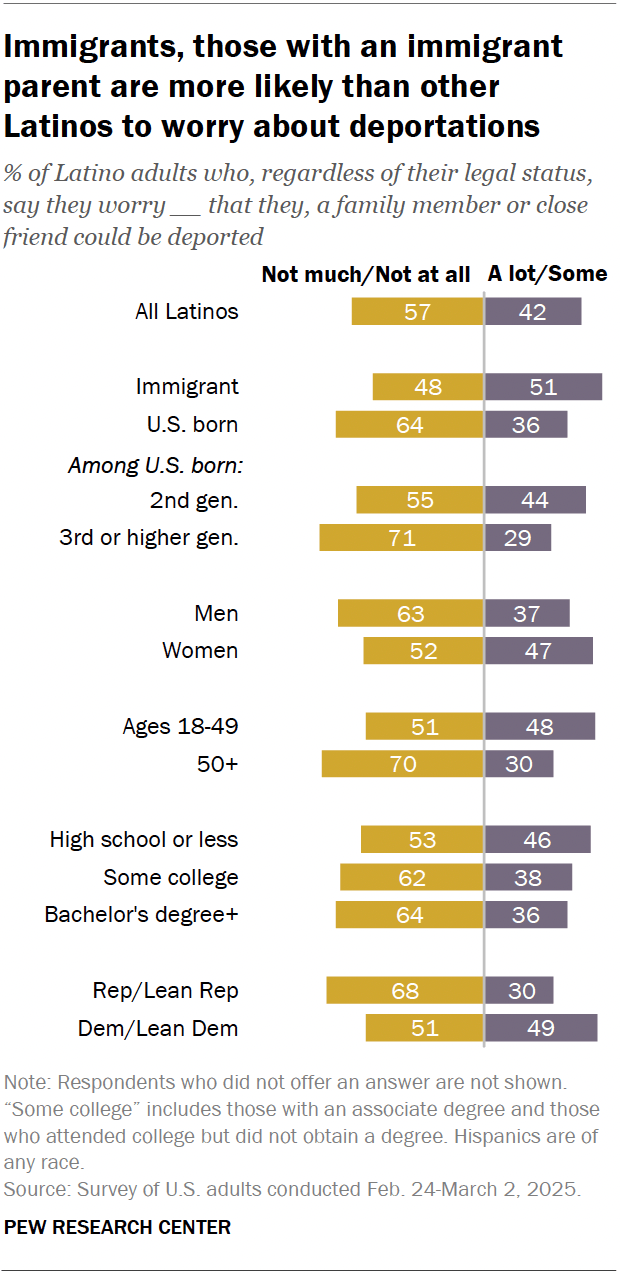Amid heightened immigration enforcement during the early weeks of President Donald Trump’s second term, 42% of Hispanic adults say they worry that they or someone close to them could be deported, according to a Pew Research Center survey of U.S. adults conducted Feb. 24 to March 2, 2025.

This is similar to the share of Latinos who expressed concern about deportations during President Joe Biden’s tenure, as well as in the later stages of Trump’s first term.
Latinos express more concern about deportations than Asian, Black and White adults, according to the new survey. They are also more likely than other racial and ethnic groups to worry about being asked to prove their citizenship or immigration status – and to say they have begun carrying documents that prove their status.
The new survey was fielded about five weeks into Trump’s second term, after the administration took several actions on immigration enforcement. It took place before several other prominent enforcement developments, which may have changed public attitudes about deportations.
At the time of the survey, more than half of U.S. Latinos (57%) said they were not much or not at all worried that they or someone close to them could be deported.
Attitudes on this question vary among Hispanic adults. For example, concerns about deportations are more common among Latino immigrants and those born in the United States with immigrant parents than among those who have been in the country for multiple generations.
Latinos’ worries about deportation over time
In March 2021, during the Biden administration, 39% of Latinos said they were worried that they or someone close them could be deported. And in December 2019, during the first Trump administration, 44% of Latinos said they worried about this.
Telephone surveys, 2007-2018
Older Pew Research Center surveys have also asked this question of U.S. Latinos, though the results of those surveys are not directly comparable to our more recent polls due to a shift in survey mode from telephone to online.
In 2007, during the George W. Bush administration, 53% of Latino adults said they worried that they or someone close to them might be deported. This share declined to 46% in 2013, during the Obama administration, before rising to 55% in 2018 amid the first Trump administration.
Many Latino adults in the U.S. are immigrants
A third of all Latinos in the United States – an estimated 21.4 million people – are immigrants, according to Pew Research Center analysis of U.S. Census Bureau data. This is lower than the 56% of Asian Americans who are immigrants, but substantially higher than the immigrant share of the country’s Black (10%) and White (4%) populations.
Latinos account for 45% of the 47.8 million immigrants living in the U.S. Asians are the next largest group, making up 28% of the country’s immigrant population.
Deportation worries among Latino subgroups
Here’s a closer look at how deportation worries vary among subgroups of Latino adults, based on the new survey:
By nativity

Among Hispanic adults, immigrants are more likely than those who are U.S. born to say they worry a lot or some that they or someone close to them might be deported (51% vs. 36%).
By immigrant generation
Among U.S.-born Latino adults with at least one immigrant parent (second generation), 44% say they worry a lot or some about deportations. By comparison, 29% of Latinos whose parents are both U.S. born (third or higher generation) say the same.
By age
Hispanic adults ages 18 to 49 are much more likely than those 50 and older to say they have concerns about deportations (48% vs. 30%).
By partisanship
About half of Latino Democrats and Democratic-leaning independents (49%) worry they or someone close to them might be deported. Fewer Latino Republicans and Republican-leaning independents (30%) say the same.
Worries among Hispanics about being asked to prove citizenship or immigration status
Around four-in-ten immigrant Latinos (39%) and around a quarter of U.S.-born Latinos (26%) express at least some concern that they will be asked to prove their citizenship or immigration status during the course of their daily activities. Majorities of both groups – 59% of immigrant Latinos and 73% of U.S.-born Latinos – say they are not too or not at all worried.
By immigrant generation
Second-generation Hispanics are more likely than third- or higher-generation Hispanics to be at least somewhat worried they will be asked to prove their U.S. citizenship or immigration status (33% vs. 18%).
By age
Latino adults ages 18 to 49 are more likely than those 50 and older to say they are least somewhat worried they will be asked to prove their U.S. citizenship or immigration status (36% vs. 23%).
By partisanship
Latino Democrats (39%) are more likely than Latino Republicans (23%) to say they are at least somewhat worried about being asked to prove their citizenship or immigration status during their daily activities.
Most Hispanics oppose allowing law enforcement immigration status checks
A majority of Hispanic adults (63%) oppose allowing law enforcement to check the immigration status of people they encounter during day-to-day activities, such as traffic stops. Smaller shares of Black (54%), Asian (54%) and White (33%) adults say this. A majority of White adults (66%) say these checks should be allowed.
About half or more of all major Latino subgroups hold this view, except Latino Republicans. Among them, 42% oppose allowing law enforcement to check for immigration status during daily activities.
